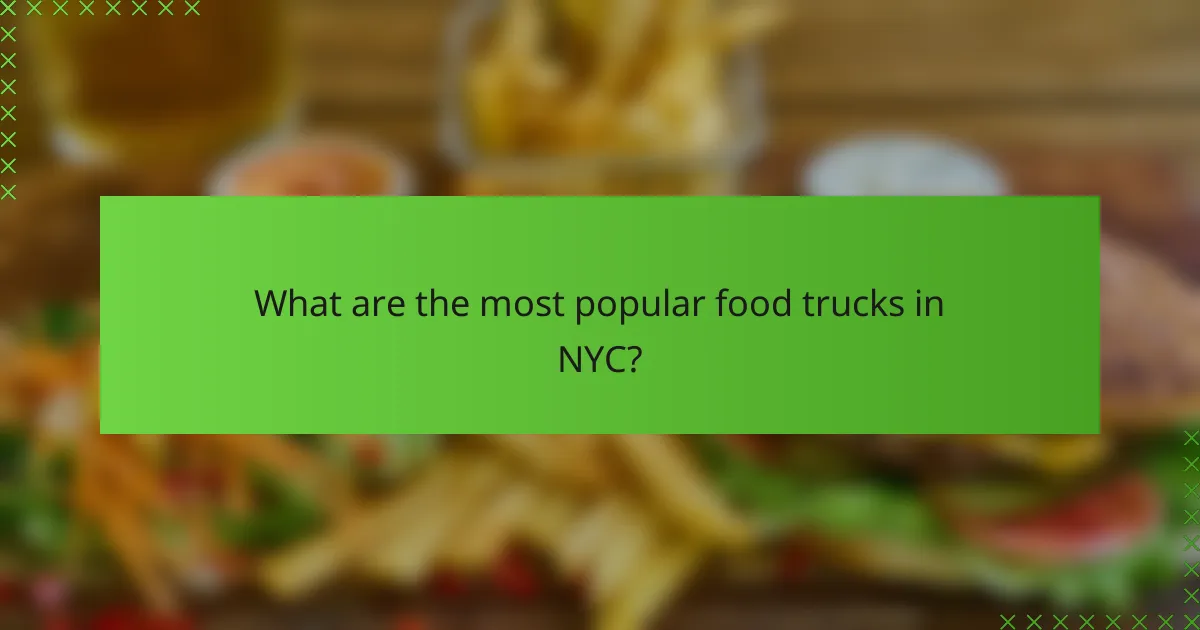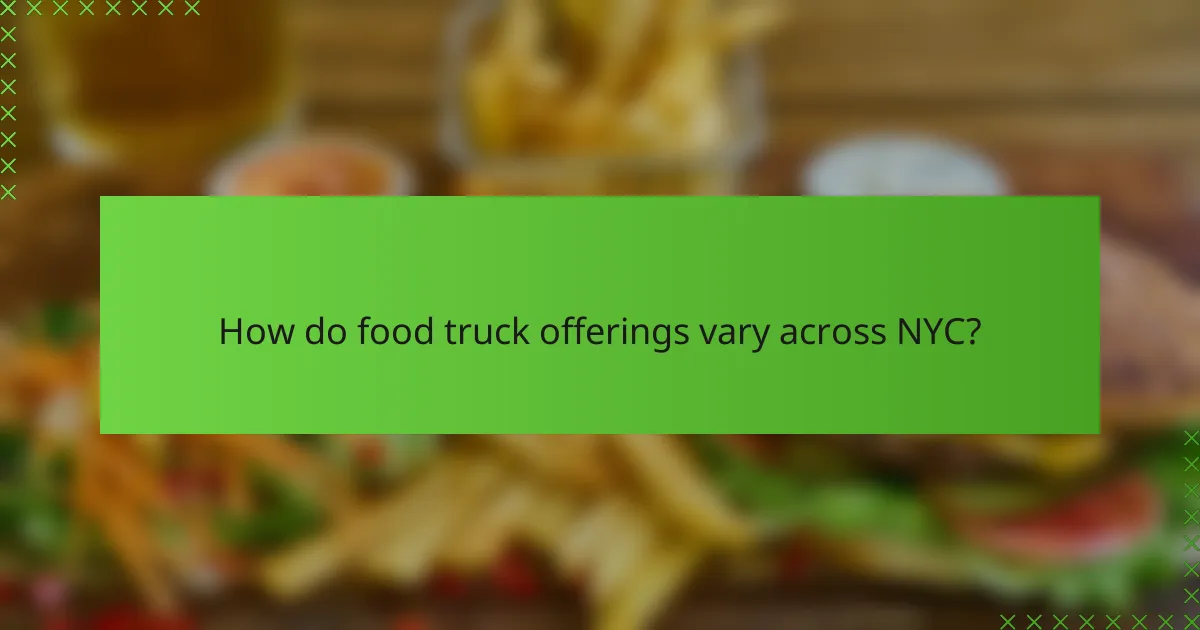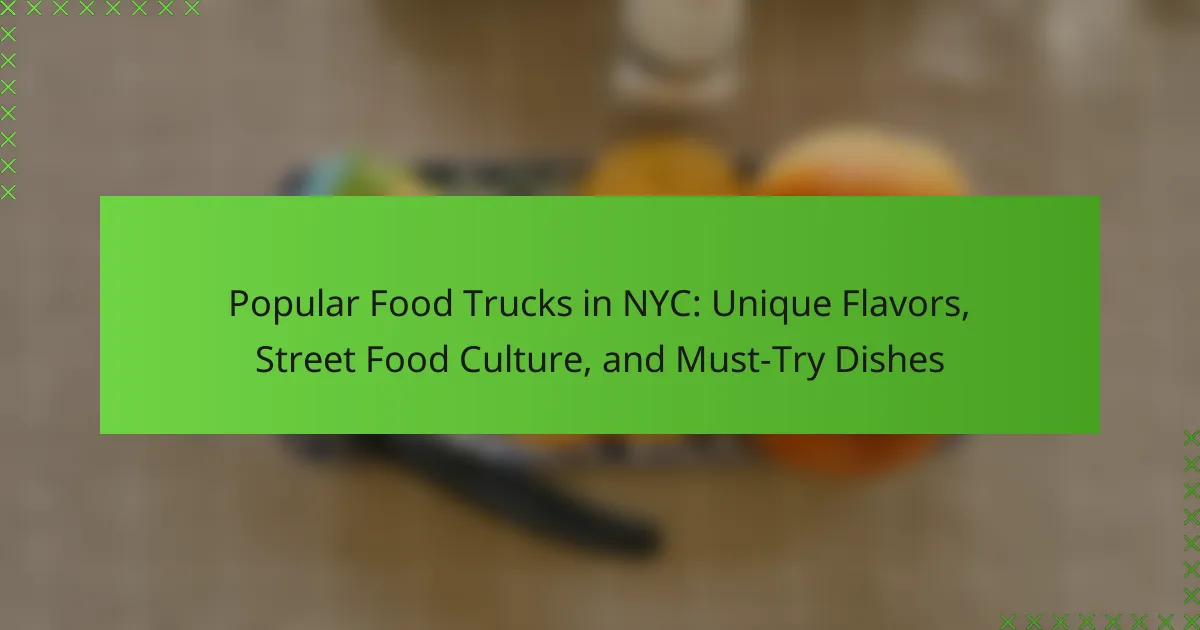
What are the most popular food trucks in NYC?
The most popular food trucks in NYC include The Halal Guys, which is famous for its chicken and gyro platters. Another top contender is the Los Tacos No. 1 truck, known for authentic Mexican tacos. Additionally, the Wafels & Dinges truck serves delicious Belgian waffles. The Korilla BBQ truck offers a unique fusion of Korean and BBQ flavors. Each of these food trucks has garnered a loyal following due to their distinctive offerings and quality. The Halal Guys, established in 1990, serves over 1,000 customers daily. Los Tacos No. 1 has been praised by various food critics for its authenticity. Wafels & Dinges has won awards for its innovative toppings. Korilla BBQ has made a mark with its creative menu and vibrant branding.
How do food trucks in NYC stand out from traditional restaurants?
Food trucks in NYC stand out from traditional restaurants due to their mobility and unique offerings. They provide diverse cuisine options in a compact space. Food trucks often feature innovative dishes that reflect global flavors. They cater to a fast-paced lifestyle, allowing quick service. Many food trucks operate in high-traffic areas, increasing accessibility. Their lower overhead costs enable competitive pricing. Additionally, food trucks often foster a sense of community through local events. This combination of factors creates a distinct dining experience not found in traditional restaurants.
What unique flavors can you find at NYC food trucks?
NYC food trucks offer a variety of unique flavors. You can find fusion dishes that blend different culinary traditions. For example, Korean tacos combine Mexican and Korean flavors. Another popular option is the Indian-inspired burrito, which wraps traditional ingredients in a tortilla. Food trucks also serve gourmet versions of classic dishes, such as lobster rolls with unique sauces. Vegetarian and vegan options feature innovative flavors, like jackfruit pulled ‘pork’ sandwiches. Additionally, dessert trucks offer unique treats like gourmet doughnuts and artisanal ice creams. These diverse offerings reflect NYC’s multicultural food scene.
How do food trucks contribute to the culinary diversity of NYC?
Food trucks enhance the culinary diversity of NYC by offering a wide range of international cuisines. They serve dishes from various cultures, such as Mexican, Indian, and Korean. This variety allows residents and visitors to experience global flavors in a single city. Food trucks often feature fusion dishes that blend traditional recipes with modern twists. They also provide affordable dining options, making diverse food accessible to a broader audience. According to a 2021 report by the NYC Department of Health, food trucks contribute significantly to the city’s food landscape. The presence of food trucks encourages culinary innovation and competition among vendors. This dynamic environment fosters a rich street food culture unique to NYC.
Why is street food culture significant in NYC?
Street food culture is significant in NYC because it reflects the city’s diversity and culinary innovation. It offers affordable, accessible meals to residents and visitors alike. Food trucks and street vendors represent various global cuisines. This variety enhances the cultural fabric of the city. According to a 2020 study by the NYC Department of Health, street food contributes over $1 billion to the local economy. Additionally, street food fosters community interactions and social connections. The vibrant atmosphere around food trucks attracts crowds and boosts tourism. Overall, street food culture plays a vital role in NYC’s identity and economic vitality.
What role do food trucks play in the local economy?
Food trucks significantly contribute to the local economy by creating jobs and generating revenue. They provide employment opportunities for chefs, drivers, and support staff. Food trucks often have lower startup costs compared to traditional restaurants. This allows entrepreneurs to enter the food industry more easily. They also attract customers to specific locations, boosting foot traffic for nearby businesses. According to a study by the National Food Truck Association, food trucks can generate an average of $300,000 in annual revenue. This economic impact stimulates local tax revenues. Additionally, food trucks promote local ingredients by sourcing from nearby farms and suppliers. This practice supports local agriculture and strengthens community ties.
How do food trucks enhance the street food culture experience?
Food trucks enhance the street food culture experience by offering diverse and accessible culinary options. They provide unique flavors that reflect local and global cuisines. This variety attracts food enthusiasts and fosters community engagement. Food trucks often serve high-quality meals at affordable prices. They create a vibrant atmosphere in urban settings, encouraging social interaction. Additionally, food trucks promote local ingredients and small businesses. Their mobility allows them to reach different neighborhoods, increasing culinary accessibility. Events featuring food trucks often draw larger crowds, further enriching the street food scene.
What are the must-try dishes from popular NYC food trucks?
The must-try dishes from popular NYC food trucks include the following. The Halal Guys serve a famous chicken and rice platter with white sauce. This dish is known for its flavorful spices and generous portions. Another popular option is the lobster roll from Cousins Maine Lobster. It features fresh lobster meat in a buttery roll. The Waffle Truck offers a unique take with their Belgian waffles topped with various sweet and savory options. Additionally, the Kimchi Taco Truck serves tacos filled with spicy kimchi and marinated meats. These dishes represent the diverse culinary offerings available from NYC food trucks. Each dish is a reflection of the city’s vibrant street food culture.
Which food trucks offer the best fusion cuisines?
It is difficult to determine which food trucks offer the best fusion cuisines as preferences vary widely among individuals. However, some notable food trucks in NYC are known for their innovative fusion dishes. For instance, the “Kogi BBQ” truck merges Korean and Mexican flavors, offering items like Korean tacos. Another example is “The Cinnamon Snail,” which combines vegan cuisine with global influences. “Bunsmith” specializes in Korean-inspired baos, blending Asian and American elements. These trucks have received acclaim for their creative menus and unique flavor profiles, contributing to the vibrant street food culture in NYC.
What are some iconic dishes that define NYC food trucks?
Iconic dishes that define NYC food trucks include halal carts, gourmet tacos, and lobster rolls. Halal carts serve chicken and rice, often with a side of salad and pita. This dish has become a staple for street food enthusiasts. Gourmet tacos feature innovative fillings, such as Korean BBQ or fish. These tacos reflect the city’s diverse culinary influences. Lobster rolls provide a taste of New England, served in a buttery bun. Each of these dishes showcases the unique flavors and cultures found within NYC’s vibrant food truck scene.

How do food truck offerings vary across NYC?
Food truck offerings in NYC vary widely based on cuisine, location, and cultural influences. Different neighborhoods showcase distinct food options, reflecting local demographics and preferences. For instance, Midtown is known for its diverse international cuisines, including Asian, Middle Eastern, and Latin American. In contrast, areas like Brooklyn may feature more artisanal and gourmet food trucks. Seasonal offerings also play a role, with trucks adapting menus to include fresh, local ingredients. Additionally, food trucks often participate in food festivals, further diversifying their offerings. The New York City Food Truck Association reports over 4,000 food trucks operating across the city, highlighting the vast range of choices available.
What types of cuisines are represented among NYC food trucks?
NYC food trucks represent a diverse array of cuisines. Common types include Mexican, serving tacos and burritos. There are also Indian food trucks offering curries and samosas. Middle Eastern options feature falafel and shawarma. Asian cuisines are prominent, with trucks serving Korean BBQ and Japanese ramen. American classics like burgers and hot dogs are widely available. Additionally, there are vegan and vegetarian food trucks providing plant-based dishes. This variety reflects New York City’s multicultural population and culinary innovation.
How do seasonal ingredients influence food truck menus?
Seasonal ingredients significantly influence food truck menus by dictating the availability and variety of dishes offered. Food trucks often adjust their menus to incorporate fresh, locally sourced produce that is in season. This practice not only enhances flavor but also supports local farmers and reduces transportation costs. For instance, during summer, food trucks may feature dishes with tomatoes, corn, and berries, while winter menus could highlight root vegetables and hearty greens. Seasonal ingredients can also inspire unique, limited-time offerings that attract customers looking for fresh experiences. Studies show that menus utilizing seasonal ingredients can increase customer satisfaction and encourage repeat business.
What are some examples of themed food trucks in NYC?
Examples of themed food trucks in NYC include the “The Lobster Place,” which specializes in seafood dishes. Another is “Wafels & Dinges,” known for Belgian waffles. “The Cinnamon Snail” offers vegan and vegetarian options. “Empanada Papa” focuses on Latin American empanadas. “Van Leeuwen Ice Cream” features artisanal ice cream. Each truck has a distinct theme and menu, catering to diverse tastes in the city.
How do food trucks adapt to changing consumer preferences?
Food trucks adapt to changing consumer preferences by diversifying their menus. They often incorporate trending ingredients and cuisines to attract new customers. Seasonal offerings are also common, aligning with consumer desires for fresh, local produce. Many food trucks engage with social media to gather feedback and understand customer tastes. They may adjust their offerings based on popular dietary trends, such as vegan or gluten-free options. This responsiveness helps them stay relevant in a competitive market. According to a 2022 survey by the National Food Truck Association, 65% of food truck operators reported menu changes based on consumer feedback.
What trends are currently shaping the food truck industry in NYC?
The food truck industry in NYC is currently shaped by several key trends. Increased demand for diverse cuisine options is evident. Food trucks are offering global flavors, catering to a variety of tastes. Sustainability practices are gaining traction among operators. Many trucks are using eco-friendly packaging and sourcing local ingredients. Technology integration is also prominent. Mobile ordering and payment apps are enhancing customer convenience. Health-conscious menus are becoming more popular. Many food trucks are featuring vegan and gluten-free options. Finally, collaboration with local chefs and restaurants is on the rise. These partnerships create unique offerings and elevate the food truck experience.
How do food trucks cater to dietary restrictions and preferences?
Food trucks cater to dietary restrictions and preferences by offering diverse menu options. Many food trucks provide vegetarian, vegan, gluten-free, and allergen-friendly dishes. This variety accommodates different dietary needs and preferences. Food trucks often label their menu items clearly to indicate ingredients. They may also allow customization of dishes to meet specific requests. Some food trucks source organic and locally grown ingredients to appeal to health-conscious consumers. Additionally, many food trucks engage with their customers to understand dietary needs better. This responsiveness helps ensure that a wider audience can enjoy their offerings.

What tips can enhance your food truck experience in NYC?
To enhance your food truck experience in NYC, consider visiting during peak lunch hours for the best selection. Popular food trucks often have long lines, so arrive early to avoid waiting. Check social media for daily locations and menus of food trucks. Many trucks offer unique dishes that reflect NYC’s diverse culture. Bring cash, as some trucks may not accept cards. Explore different neighborhoods to discover hidden gems. Try to sample from multiple trucks to experience various flavors. Lastly, engage with the food truck community for recommendations and tips.
How can you find the best food trucks on any given day?
To find the best food trucks on any given day, utilize food truck tracking apps. Apps like Roaming Hunger and Food Truck Finder provide real-time locations. Social media platforms also feature food truck schedules and updates. Many food trucks post their daily locations on Instagram or Twitter. Check local food blogs for curated lists of popular trucks. Reviews and ratings on platforms like Yelp can guide your choices. Visiting food truck festivals is another way to discover top vendors. Local food events often showcase the best in the area.
What are the best times to visit popular food truck locations?
The best times to visit popular food truck locations are typically during lunch hours and early evening. Lunch hours, from 11 AM to 2 PM, attract office workers and tourists. Early evening, around 5 PM to 8 PM, sees a surge of diners after work. Weekdays generally have higher foot traffic. Weekends can be busy, especially in popular parks or during events. Visiting during these times ensures access to a variety of food options. Popular food trucks often have long lines during peak hours, indicating high demand.
How can you maximize your culinary adventure with food trucks?
To maximize your culinary adventure with food trucks, explore diverse cuisines. Food trucks offer a variety of global flavors in one location. Visit food truck festivals to sample multiple vendors. Utilize social media to track popular food trucks and their locations. Engage with food truck owners for insider recommendations. Try seasonal specials, as they often feature unique dishes. Pair food truck meals with local beverages for a complete experience. Check reviews and ratings to discover highly recommended options.
What are some common challenges faced by food truck owners?
Food truck owners face various challenges that can impact their business operations. One major challenge is navigating local regulations and permits. Many cities have specific laws governing where food trucks can operate, which can limit their locations. Additionally, competition is fierce in urban areas, making it difficult for food trucks to stand out.
Operational costs also pose a significant challenge. Expenses for ingredients, fuel, and maintenance can quickly add up. Weather conditions can affect sales, as inclement weather may deter customers.
Moreover, food truck owners often struggle with staffing issues. Finding reliable employees who can work flexible hours is essential but can be challenging. Marketing and building a loyal customer base is another hurdle, as food trucks rely heavily on social media and word-of-mouth to attract patrons.
These challenges require careful planning and adaptability to ensure success in the competitive food truck industry.
How do food trucks navigate regulations and permits in NYC?
Food trucks in NYC navigate regulations and permits by adhering to city guidelines. They must obtain a mobile food vendor license from the NYC Department of Health. Additionally, they require a food service establishment permit. Food trucks must also secure a street vendor license. This involves following zoning laws and restrictions on vending locations. Compliance with health and safety regulations is mandatory. Food trucks often face inspections to maintain standards. Many rely on legal advice to understand complex regulations. This ensures they operate within the law and avoid fines.
What strategies help food trucks maintain customer loyalty?
Food trucks maintain customer loyalty through consistent quality, unique offerings, and engaging customer interactions. Consistent quality ensures that customers receive the same great taste every visit. Unique offerings, such as signature dishes or seasonal specials, attract repeat customers. Engaging customer interactions foster a sense of community and connection. Many food trucks utilize social media to communicate with customers and share updates. Loyalty programs can incentivize repeat visits by rewarding customers for their purchases. Additionally, participating in local events helps food trucks build brand recognition and loyalty. These strategies collectively enhance customer retention and satisfaction.
Popular food trucks in NYC represent a diverse array of cuisines and unique flavors, significantly contributing to the city’s vibrant street food culture. Key players include The Halal Guys, Los Tacos No. 1, Wafels & Dinges, and Korilla BBQ, each known for their distinctive offerings and loyal customer bases. The article explores how food trucks differ from traditional restaurants, highlight must-try dishes, and discuss their role in enhancing culinary diversity and supporting the local economy. Additionally, it addresses current trends, consumer preferences, and challenges faced by food truck owners in navigating regulations and maintaining customer loyalty.
